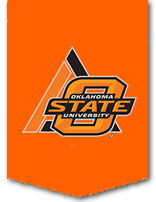Ensuring future food safety through research monetary gift
Ensuring future food safety through research monetary gift
By Kylee Willard
FAPC Communications Graduate Assistant
(Stillwater, Okla. – May 23, 2012) Nutritional Physiology Company (NPC) provided a lofty contribution for the research of food applications at Oklahoma State University’s Robert M. Kerr Food & Agricultural Products Center (FAPC). The $30,000 research gift directed to Peter Muriana, FAPC food microbiologist and OSU animal science professor, provides resources to develop antimicrobial cultures for enhancing the safety of food products.
“This generous gift to antimicrobial culture research at the FAPC provides an opportunity to apply our research results towards the commercialization of products that can benefit consumers by enhancing food safety,” Muriana said.
With the passing of the distinguished food microbiologist, Stanley Gilliland, the director of the FAPC, Roy Escoubas, called upon NPC for guidance and evaluation of Gilliland’s antimicrobial culture collection.
“NPC is the leading royalty generator at Oklahoma State University,” Escoubas said. “When it was time to evaluate what to do with Dr. Gilliland’s remaining cultures, contacting NPC was the logical decision.”
The culture collection discussion led to conference call with NPC co-founder and chief scientific officer, Douglas Ware.
“Dr. Gilliland was a world renowned scientist who contributed greatly to the field of food microbiology,” Ware said. “When we started NPC, we wanted our company to tap into that level of quality research.”
During the conference call, Muriana introduced his bacteriocin-producing lactic acid bacteria work. After hearing the continued developments of research at the FAPC, Ware invited FAPC’s Muriana and Mindy Brashears, professor and director of the International Center for Food Industry Excellence at Texas Tech University, to visit about the Gilliland collection with NPC at their Dallas, Texas, location.
“The group brainstorming was followed by presentations of past and recent work, work in progress and future applications of antimicrobial culture technology,” Muriana said.
Muriana presented ways his current research with lactic acid bacteria and foodborne pathogen research at the FAPC would benefit NPC from the use of his cultures and complement the work started by Gilliland.
“I presented research I have conducted at the FAPC in the characterization of bacteriocin-producing lactic acid bacteria and the manner in which I can identify those having different modes of action, as well as, using molecular techniques to quickly identify their specific gene sequences,” Muriana said. “By combining those with different modes of action, we can see a synergy of antimicrobial activity against foodborne pathogens.”
With close alignment of Muriana’s research and NPC’s visions for innovative microbial technology, Ware offered the monetary gift to further Muriana’s research.
“We think that food safety is extremely important for people around the world,” Ware said. “Oklahoma State University is one of the very top universities in the country dedicated to improving the food supply."
To fulfill matching maximums from the Oklahoma Center for the Advancement of Science and Technology (OCAST), Muriana summoned $15,000 of annual royalties from OSU’s animal science department in addition to the Ware’s $30,000 generating $45,000 from the two entities.
“With annual royalties from the animal science department and the NPC gift, total funding of $90,000 per year for up to two years was granted to work with these antimicrobial cultures,” Muriana said. “The three-to-one ratio really maximizes the NPC donation and increases the value of their gift.”
With the NPC’s gift, Muriana’s research focus with antimicrobial cultures in food products complements that of Gilliland’s work with antimicrobial cultures for cattle.
“My research from the NPC gift includes evaluating probiotic bacteria for use in food products,” Muriana said. “Specifically, I will focus on the development of antimicrobial lactic acid bacteria for the inhibition of pathogens in foods. The bacteriocin-producing cultures, or the bacteriocins themselves, will be used in food applications to control Listeria monocytogenes, Salmonella, E. coli O157:H7and Staphylococcus aureus.”
NPC’s current interests consist of food applications in raw ground meat products and processed, ready-to-eat meats.
“For example, we should be able to show that application of our ‘good bugs’ onto raw or processed meat products can reduce pathogens and/or increase shelf life,” Muriana said. “For us to demonstrate the efficacy of these antimicrobials would be of great benefit to the food industry and great interest to NPC.”
In addition to the research component, Muriana intends to create a powerhouse for antimicrobial research through assembling a team of workers to advance the practical applications of the work.
“I hope to create an expansive group to exploit antimicrobial culture research through seeking a post doctoral scientist, and master of science and doctoral students to assist in this research,” Muriana said. “I have been retooling our research capabilities to position ourselves in a number of potential applications.”
Since the monetary award, work referenced by Muriana has been submitted for licensing with OSU’s Office of Intellectual Property.
Chuck Willoughby, FAPC business and marketing relations manager, said the FAPC appreciates the generous gift provided by NPC to Muriana’s research program.
“Industry sponsored research is very important to the success of the center’s mission and adding value to Oklahoma,” Willoughby said. “We are truly thankful to NPC for their support and providing funding to enhance the research based knowledge FAPC provides to Oklahoma’s food industry.”
- ### -
Oklahoma State University, U.S. Department of Agriculture, State and Local Governments Cooperating. The Oklahoma Cooperative Extension Service offers its programs to all eligible persons regardless of race, color, national origin, religion, sex, age, disability, or status as a veteran, and is an equal opportunity employer.

